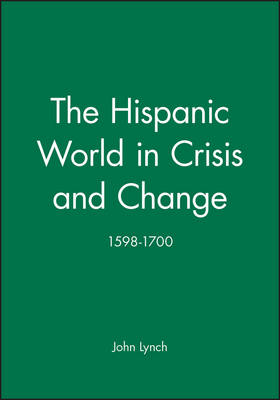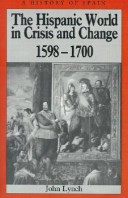History of Spain
4 total works
In this book, John Lynch has taken account of the research of the last decade to revise and expand his "Spain Under the Habsburgs Vol 1", and has incorporated it into the series "A History of Spain" (where it will cover the 16th century). The book retains its previous framework and identity, and remains a comprehensive account of the economy, politics and society of Spain, from the national foundations laid by Ferdinand and Isabella to the imperial policy of Charles V, and the world power of Philip II. The new research of the last 10 to 15 has increased our knowledge of the people, the resources and the institutions of early modern Spain. The result has been to change our perceptions of Spain during this period sufficiently to make historians reflect anew on familiar subjects. The author offers here a reappraisal of many of these subjects, including the Catholic monarchs, and a number of institutions, including the Inquisition. Chapters IV and V, on Spain during the price revolution, and Spain and its empire have been rewritten and expanded, Chapter V to include a fuller account of Spain's interaction with its American empire.
The author also re-interprets the political, social and economic history of Spain, and the absolutism of Philip II. He examines the trend towards regionalisms and the devolution of power to local elites, as well as the economic power of the aristocracy and the worsening conditions of the rural poor. Professor Lynch revises his previous treatment of bureaucratic devolution, royal finance and the role of the cortes, and establishes the character of royal bureaucracy during the period. He concludes with a new bibliography of recent works in the field.
The author also re-interprets the political, social and economic history of Spain, and the absolutism of Philip II. He examines the trend towards regionalisms and the devolution of power to local elites, as well as the economic power of the aristocracy and the worsening conditions of the rural poor. Professor Lynch revises his previous treatment of bureaucratic devolution, royal finance and the role of the cortes, and establishes the character of royal bureaucracy during the period. He concludes with a new bibliography of recent works in the field.
This text describes the history of a crucial century for Spain, when statesmen had to innovate and people to adjust. Under Charles III the power of the state and the impulse to reform reached their peak, and his reign was viewed by posterity as a model of enlightened absolutism. John Lynch takes as his theme the interplay between new policy and changing conditions in Spain and its empire. Population growth increased the pressure on land and depressed rural living standards, at a time when rising grain prices brought landowners great profit. Lynch considers whether reformers had the will or the means to effect the structural changes needed in Spain, abolish privilege, liberalize land policy and redistribute resources. In doing so, he highlights the critical importance of Spain's American empire in the Bourbon programme. This book explores the limits of modernization and of the classical dilemma confronting Spanish government: how could it reform the existing system without subverting it?.
The seventeenth century has gained enormously from the resurgence of historical studies in Spain and from the contributions of historians outside the penninsula. In this book, John Lynch has taken account of this research to substantially revise and expand his Spain Under the Hapsburgs, Volume II . It retains its previous framework, and provides a penetrating account of Spanish society, economy, government and politics during this period.
This revised and expanded version of the author's "Spain Under the Habsburgs, Volume II" examines the regimes of Philip III and Lerma, and Philip IV and Olivares, the mid-century revolutions, the progress of depression, the balance of progress and poverty under Charles II, and the relations between Spain and her colonies.



